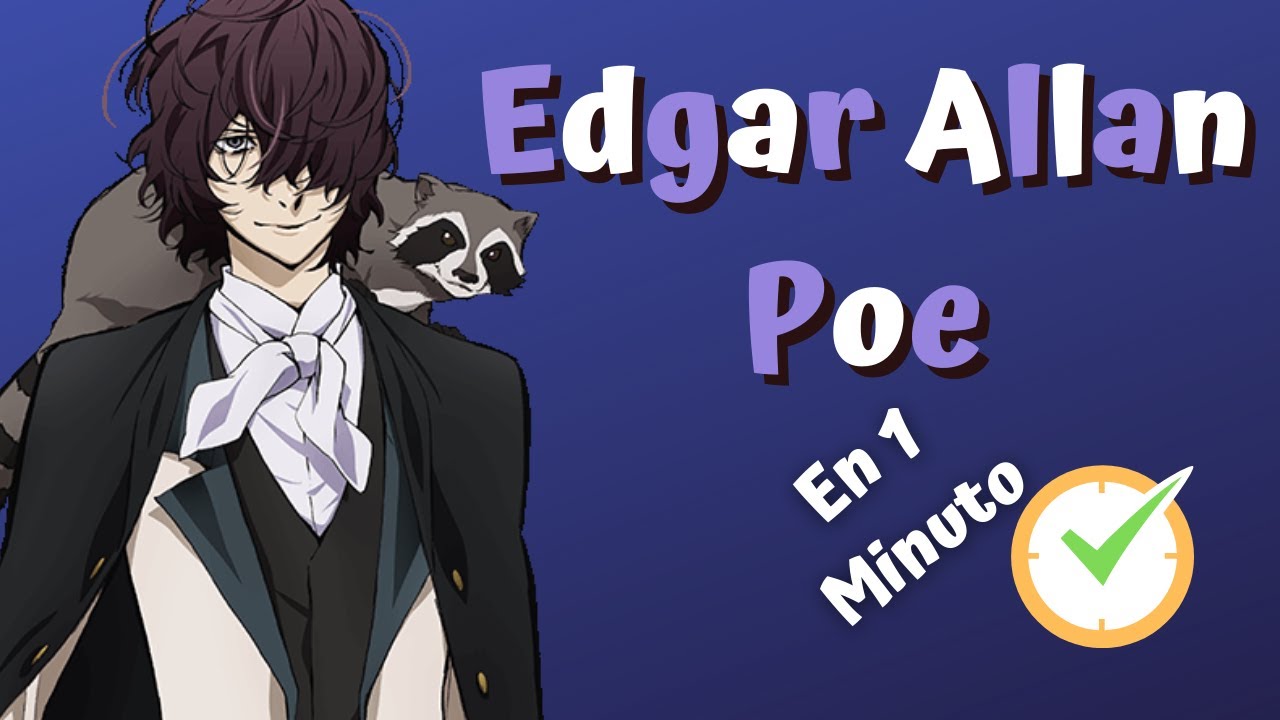
Edgar Allan Poe’s Enduring Influence on Bungo Stray Dogs: A Literary Homage
Edgar Allan Poe, the master of the macabre, continues to cast a long shadow over literature and popular culture. His tales of mystery, horror, and psychological depth have inspired countless writers and artists across various media. One particularly fascinating example of Poe’s influence can be found in the Japanese manga and anime series, *Bungo Stray Dogs*. This series cleverly incorporates real-life literary figures, reimagining them as characters with supernatural abilities based on their famous works. Edgar Allan Poe, in *Bungo Stray Dogs*, is no exception, embodying the essence of his literary persona while adding a unique twist to the narrative. This article will delve into how *Bungo Stray Dogs* draws upon Poe’s life and works, exploring the ways in which the series pays homage to this iconic American author.
The Literary Landscape of Bungo Stray Dogs
*Bungo Stray Dogs* is set in a fictionalized version of Yokohama, Japan, where individuals known as “gifted” possess extraordinary abilities tied to famous literary works or authors. The Armed Detective Agency, a group of gifted detectives, and the Port Mafia, a criminal organization also composed of gifted individuals, frequently clash, creating a dynamic and often chaotic environment. The series is a vibrant tapestry woven with literary allusions, character names, and power sets that directly reflect the authors and their creations. From Osamu Dazai’s suicidal tendencies to Ryunosuke Akutagawa’s Rashomon ability, the series is rich with literary Easter eggs that add layers of depth and intrigue.
Edgar Allan Poe in Bungo Stray Dogs: A Character Study
In *Bungo Stray Dogs*, Edgar Allan Poe is portrayed as a powerful gifted individual affiliated with the Guild, an American organization of gifted individuals led by Francis Scott Key Fitzgerald. Poe’s ability, named “Edgar Allan Poe,” allows him to trap people inside his novels, creating immersive and often nightmarish worlds. This ability is a direct reflection of Poe’s skill in crafting vividly imaginative and psychologically disturbing stories. The character design itself incorporates elements of Poe’s iconic image: a pale complexion, dark hair, and an air of brooding intensity. His personality is depicted as introverted and somewhat eccentric, mirroring the real-life Poe’s reputation as a literary genius with a troubled personal life. His interactions with other characters, particularly Ranpo Edogawa, highlight his intellectual prowess and competitive spirit. [See also: Osamu Dazai’s Literary Inspirations in Bungo Stray Dogs]
Poe’s Ability: The Power of Imagination
The “Edgar Allan Poe” ability is one of the most intriguing aspects of his character in *Bungo Stray Dogs*. The ability allows Poe to create entire worlds within his novels, trapping his opponents in these meticulously crafted realities. This power showcases Poe’s mastery of storytelling and his ability to transport readers into the depths of his imagination. The worlds he creates are often filled with psychological traps and unsettling imagery, reflecting the themes and motifs prevalent in his own literary works. The ability is not merely a tool for combat; it is an extension of Poe’s artistic vision, a way for him to express his creativity and challenge his opponents on an intellectual and psychological level. The ability to trap someone in a novel is a powerful metaphor for the immersive and captivating nature of Poe’s writing.
Poe’s Relationship with Ranpo Edogawa
One of the most compelling relationships in *Bungo Stray Dogs* is the rivalry between Edgar Allan Poe and Ranpo Edogawa. Ranpo, a member of the Armed Detective Agency, possesses the “Super Deduction” ability, which allows him to solve any mystery with unparalleled accuracy. Poe sees Ranpo as his intellectual rival, constantly striving to surpass him in terms of deductive reasoning and storytelling prowess. Their interactions are characterized by a mix of respect and animosity, as they both recognize the other’s exceptional abilities. Their rivalry is not merely a matter of competition; it is a clash of different approaches to mystery and deduction. Poe relies on intricate plots and psychological manipulation, while Ranpo relies on his intuitive understanding of human behavior and his ability to see through deception. This dynamic tension between Poe and Ranpo adds depth to both characters and provides some of the most engaging moments in the series.
Literary Allusions and References to Poe’s Works
*Bungo Stray Dogs* is replete with references to Edgar Allan Poe’s most famous works. From subtle nods to direct adaptations, the series pays homage to Poe’s literary legacy in various ways. The names of Poe’s abilities and the scenarios within his novel-worlds often draw inspiration from his stories, poems, and essays. For example, the chilling atmosphere and psychological torment within Poe’s ability often echo the themes found in stories like “The Tell-Tale Heart” and “The Fall of the House of Usher.” [See also: The Port Mafia’s Dark Underbelly in Bungo Stray Dogs]
The Tell-Tale Heart
“The Tell-Tale Heart,” one of Poe’s most famous short stories, explores the themes of guilt, paranoia, and the descent into madness. The story’s protagonist is driven to murder an old man because of his perceived “evil eye.” The protagonist’s increasing anxiety and the haunting sound of the old man’s beating heart ultimately lead to his confession. In *Bungo Stray Dogs*, elements of “The Tell-Tale Heart” can be seen in the psychological manipulation and the unsettling atmosphere within Poe’s novel-worlds. The sense of unease and the feeling of being watched are reminiscent of the protagonist’s paranoia in Poe’s original story.
The Raven
“The Raven,” Poe’s iconic poem, is a haunting exploration of grief, loss, and the supernatural. The poem tells the story of a grieving man visited by a raven that repeats the word “Nevermore,” driving him further into despair. While there is no direct adaptation of “The Raven” in *Bungo Stray Dogs* regarding Edgar Allan Poe, the poem’s themes of loss and despair resonate with the overall tone of the series. The raven itself, as a symbol of foreboding and ill omen, appears throughout the series, often foreshadowing tragic events.
The Fall of the House of Usher
“The Fall of the House of Usher” is a gothic tale of isolation, decay, and the interconnectedness of mind and matter. The story follows the narrator’s visit to his childhood friend, Roderick Usher, who is suffering from a mysterious illness. As the story progresses, the Usher family mansion begins to reflect the deteriorating mental state of its inhabitants, ultimately leading to its collapse. In *Bungo Stray Dogs*, the themes of decay and psychological torment found in “The Fall of the House of Usher” are often incorporated into Poe’s novel-worlds. The sense of claustrophobia and the feeling of being trapped within a crumbling environment are reminiscent of the Usher mansion.
The Broader Impact of Poe’s Legacy
Edgar Allan Poe’s influence extends far beyond *Bungo Stray Dogs*. His works have inspired countless writers, filmmakers, and artists across various genres. His contributions to the development of the detective story, the horror genre, and psychological fiction are immeasurable. Poe’s ability to create atmosphere, evoke emotion, and explore the depths of the human psyche has cemented his place as one of the most important and enduring figures in American literature. The enduring appeal of Edgar Allan Poe lies in his ability to tap into the universal fears and anxieties that resonate with readers across generations. His stories continue to challenge and provoke, inviting us to confront the darker aspects of human nature. His influence on *Bungo Stray Dogs* is just one example of the many ways in which Poe’s legacy continues to shape and inspire contemporary culture. Edgar Allan Poe’s works continue to be analyzed and reinterpreted, ensuring that his voice will continue to be heard for generations to come. The series, *Bungo Stray Dogs*, masterfully incorporates his essence.
Conclusion: A Fitting Tribute
The portrayal of Edgar Allan Poe in *Bungo Stray Dogs* is a fitting tribute to the master of the macabre. The series not only captures the essence of Poe’s literary persona but also adds a unique and engaging twist to his character. By reimagining Poe as a gifted individual with the ability to trap people inside his novels, *Bungo Stray Dogs* celebrates his creative genius and his enduring influence on popular culture. The series’ clever use of literary allusions and its dynamic character interactions make it a compelling and entertaining exploration of the literary world. For fans of Edgar Allan Poe and anime alike, *Bungo Stray Dogs* offers a unique and rewarding experience that bridges the gap between classic literature and contemporary entertainment. The character of Edgar Allan Poe is a testament to the power of storytelling and the enduring appeal of literary legends. The series, *Bungo Stray Dogs*, successfully honors his legacy while creating a compelling narrative of its own. Edgar Allan Poe’s influence on *Bungo Stray Dogs* is undeniable, making the series a fascinating study in literary adaptation and homage.

